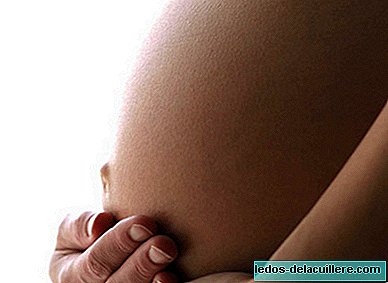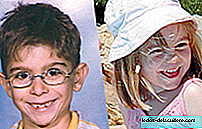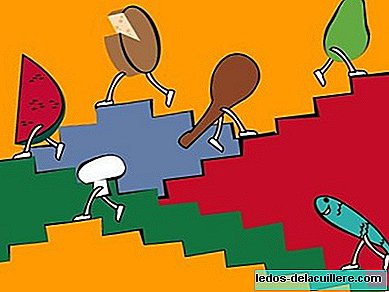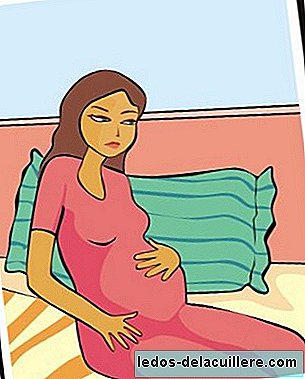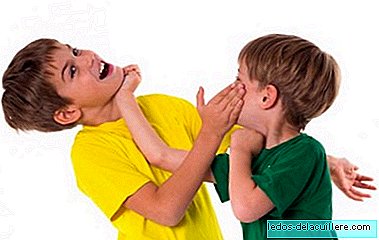
One of the reasons (of so many) why you should not hit a boy or girl is for the example we are giving you in doing so. Something like pretending to teach how to do things well through cheek and pain, teach what is right with something that is wrong. The situation comes to the absurd when a child hits another and to teach him not to hit we say "Don't stick!" and then we slap them as punishment for hitting: I hit you so you don't hit.
Come on, it is said that "do not hit your children so they do not learn to hit", and many times when someone asks "Why does my child hit?" there are those who respond: "because you will have hit him or because he has seen someone hit". However, it is not a completely correct answer, because there are more reasons and it is not always for visual learning. In fact, it has happened to me. At home we do not beat them or punish them, but my children have hit other children. Do you want to know what the reason may be? Why hit if we have never hit them?
If crying is the way to say you're not well, hitting can be the way to say you're angry
We know it, we are clear: when a baby cries it is telling you that it needs something. He does not say what, because he cries and period, but he tells us that he is not at ease and it is we who have to know what happens to him. When they grow up and have a minimum age they learn to ask for many things in another way, pointing, with signs that we just understood, etc., and the crying is more relegated to pain or desire not granted by us, the feeling that we are being unfair or that we are not meeting their expectations for denying them something they want.
And why do they cry? Well, because they don't know how to tell us that, "I was very excited that you gave me that, right now, because I can't think of anything else and I would love to be able to touch it for a while and see what it is. You let me down and it will cost me to recover from this disgust ... maybe I won't talk to you in the next 4 minutes. " I have added the 4 minutes as a humor, because many times we find two children fighting to the death for an object, as if their possession meant the difference between living or dying, and after us interceding and trying to solve the very serious problem, we realize, 4 or 5 minutes later, that the object lies abandoned while the children who, minutes ago, faced each other in a war where only one could survive play something else as if they were the best friends since before they were born.
To what was going, as they are not able to express themselves they make use of the tools they have and know, in this case the crying, to ask for what they want. Now, how do they express their anger? Because an anger rages out, the pulsations increase and the body prepares for flight or fight, activating our most primitive brain and blocking the rational brain.
The adults who helped us the most to control our anger, because they explained things to us with love and knew how to argue why and why not of things we are able to control our rabies accesses a lot and look for effective ways to express anger and find a solution (or try to find it). The adults whose rabies controlled us with reprimands so that we would shut up or ignore our complaints, without taking our feelings seriously, we learned to drown our needs and it is hard for us to get angry because we have simply become conformist. And the adults who allowed us all the rage, let us complain, shout, hit and nobody told us that it is not done, but "they were little things", because they may still be people with little control of their rage and A great facility to lose your temper.
Therein lies the big difference, that there are adults who behave like children, and there are others that are so rational or so muted in their desires and expectations, that they have largely blocked the impulse of anger and know how to control it.
All this I explain to make you see that young children are at that time when they feel that the body is put to one hundred, wanting to release all that peak of energy in any way and, as its rational part does not allow them to control , they let go of their anger with screaming, crying, anger and hitting, scratching or pinching with full force. In adults, because this process goes from "I don't get angry" to "I scream and break things", through "I just scream", "I say all the swear words that occur to me", etc.
Come on, that children do not hit because they have learned to paste (it can also happen, eye), but because they have not yet learned to explain in words how they feel, what they expected to happen and why they are upset.
"Don't hit, talk"
It is one of the phrases that I usually say to my children when I see that they cannot find a way to manage a conflict and end up pulling their hands. I separate you I tell you not to stick and I beg you to speak. "Don't hit, talk. Tell him why you got angry. Tell him how you feel." No one likes to make others angry, let alone if the others are your brothers, so it is worth saying the reason for anger so that the other knows him, that sometimes the other does not even know what the story is about when He has received the first blow.

Gradually you have to work on these situations so that they gradually learn to express their emotions and, in rebound, they themselves understand their feelings and feelings. That they realize that they are angry, why they are angry, and that they see that we realize it and that we know that it is important for them. "It seems that you have been angry and I know that you want to hit him, but you cannot. He does not stick. If he has done something wrong you have to tell him. Explain it to him so that he knows what has bothered you." And then it works based on that, because you know, he has been angry because at that time his brother has taken a toy that belongs to him (the brother) and with which he wanted to play. And then it will be necessary to explain that yes, that he is angry, but that he should not forget that the toy is not his, but that he can ask his brother to leave it when he finishes playing with it.
It's just an example of so many, but basically what I want to clarify is that we talk about an instinct, which is normal, which is a solution that they try in case it works, but as parents we must not allow. We accept anger, we accept your feelings, but not the solution.
If, as I said, we don't even accept anger "don't get mad that it's not so much", "you can't be angry about that nonsense", "shut up you're not right" we can achieve impulse control, but based to control their feelings of justice or injustice, and this is dangerous because a child can lose critical ability about things around him to give it to adults, which seems to be the ones who know when to get angry and when not. And when that is given to others, you can be a victim of anything without looking "so serious" (from a controlling couple to a government that leaves you without rights).
Photos | Thinkstock
In Babies and more | What do I do if my child bites or hits ?, Do we teach them to hit without noticing ?, Obedience is dangerous: the Milgram experiment


